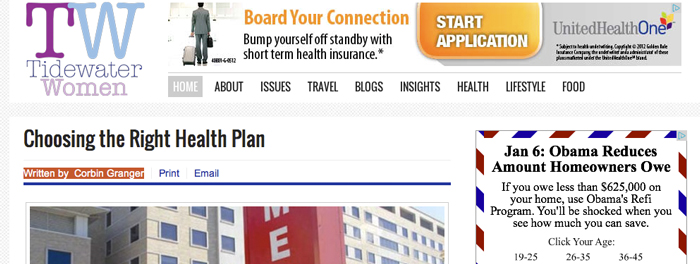OUTLET: Tidewater Women
Written by Corbin Granger
Susan Byrum and her family lost access to their health insurance in December because it had become cost prohibitive for her employer. For some families, that’s a setback. For the Byrums, it was a disaster because their 20-year old son Nathan has a rare autoimmune disease and requires a medication that costs more than $16,000 every two months.
Susan could not afford a lapse in coverage, even for a day, so she had to work quickly to secure affordable insurance through the government Marketplace.
Fortunately her employer’s benefits company, TFA Benefits, learned of her plight and quickly helped the family find a policy. Their monthly premium is now $370—and once their son’s deductible of $3,400 annually is met, they will pay 15 percent of his medical bills thereafter. The rest of the Byrum family, however, will also have a collective $3,400 deductible before their copays begin.
With a looming deadline of March 31 and many yet to enroll, there is still time to review your Marketplace benefit options. Just because a healthcare plan appears affordable, however, does not mean it is the right one over the long run. If you need health insurance for yourself, for your family, or for employees—whether on or off the Marketplace—there are benefits to using an insurance broker to explore your options.
Insurance brokers provide a service similar to websites like Expedia or Travelocity. However, an insurance broker will help you compare insurance plans so you understand exactly what you are buying and how much you’ll pay in premiums, co-pays, and deductibles.
Many who purchase insurance on their own later discover that their plan doesn’t meet their needs. For instance, it may not allow you to see your regular doctors or cover your prescriptions, resulting in thousands of dollars in out-of-pocket expenses.
For those going to the Marketplace, a broker can guide you on eligibility for a subsidy and what the subsidy would deduct from the cost of your plan. A subsidy is a tax credit that the government pays towards the purchase of insurance, thereby reducing monthly premiums.
Under the Affordable Care Act, Bronze Plans are the least expensive but also have the highest out-of-pocket costs. Even with a Silver Plan, which has less out-of-pocket expense, you must be careful because in most cases a deductible will have to be paid before full coverage begins.
For example on the Marketplace, the benchmark Silver Plan in the Hampton Roads area has what is known as an embedded deductible, which is $3,500 for an individual and $6,700 for a family. However, the lowest cost Silver Plan has a non-embedded deductible of $3,500/$7,000, which means that a combination of the entire household’s out-of-pocket expenses must hit $7,000 before the plan covers 80 percent of bills for the remainder of that year.
It’s also important for patients with cancer or chronic conditions, such as rheumatoid arthritis or diabetes, to know whether the medications they take are covered and at what level. If not, that inexpensive plan you purchased could be quite the opposite.
So what are your choices? You can select a higher level plan with a lower deductible or one from a different carrier that has an embedded deductible, meaning it will start paying 80 percent as soon as you hit the $3,500 individual threshold. You would not want to be in the middle of treatments only to learn you still have another $3,500 in out-of-pocket costs.
For the foreseeable future, there will likely be continued confusion over eligibility, subsidy levels, and plan options. For that reason you may want to contact an insurance broker to help you navigate the Affordable Care Act. As the Byrums discovered, there is no cost to consult with an insurance professional, nor will it raise your premium; but it will provide greater peace of mind.
Corbin Granger is a Compliance Training Specialist with TFA Benefits. As part of the TowneBank family, TFA Benefits shares Towne’s unwavering commitment to serving clients, brokers, and the Hampton Roads community.

